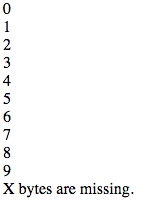Using the send() function to pass values to a generator
suggest changeGenerators are fast coded and in many cases a slim alternative to heavy iterator-implementations. With the fast implementation comes a little lack of control when a generator should stop generating or if it should generate something else. However this can be achieved with the usage of the send() function, enabling the requesting function to send parameters to the generator after every loop.
//Imagining accessing a large amount of data from a server, here is the generator for this:
function generateDataFromServerDemo()
{
$indexCurrentRun = 0; //In this example in place of data from the server, I just send feedback everytime a loop ran through.
$timeout = false;
while (!$timeout)
{
$timeout = yield $indexCurrentRun; // Values are passed to caller. The next time the generator is called, it will start at this statement. If send() is used, $timeout will take this value.
$indexCurrentRun++;
}
yield 'X of bytes are missing. </br>';
}
// Start using the generator
$generatorDataFromServer = generateDataFromServerDemo ();
foreach($generatorDataFromServer as $numberOfRuns)
{
if ($numberOfRuns < 10)
{
echo $numberOfRuns . "</br>";
}
else
{
$generatorDataFromServer->send(true); //sending data to the generator
echo $generatorDataFromServer->current(); //accessing the latest element (hinting how many bytes are still missing.
}
}Resulting in this Output:

Found a mistake? Have a question or improvement idea?
Let me know.
Table Of Contents